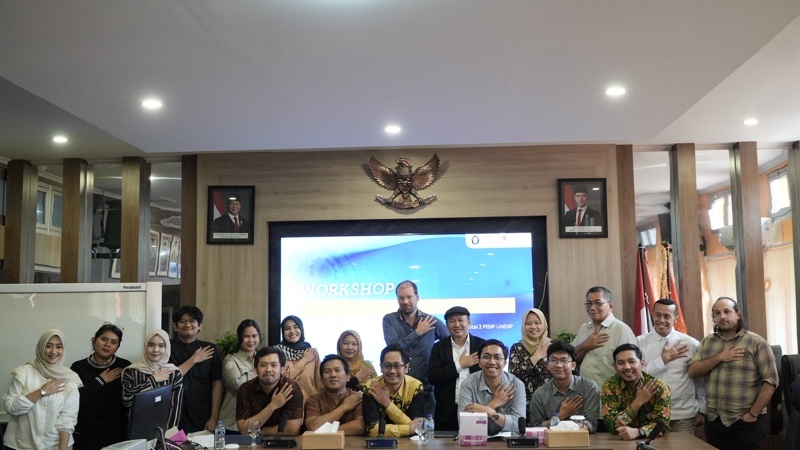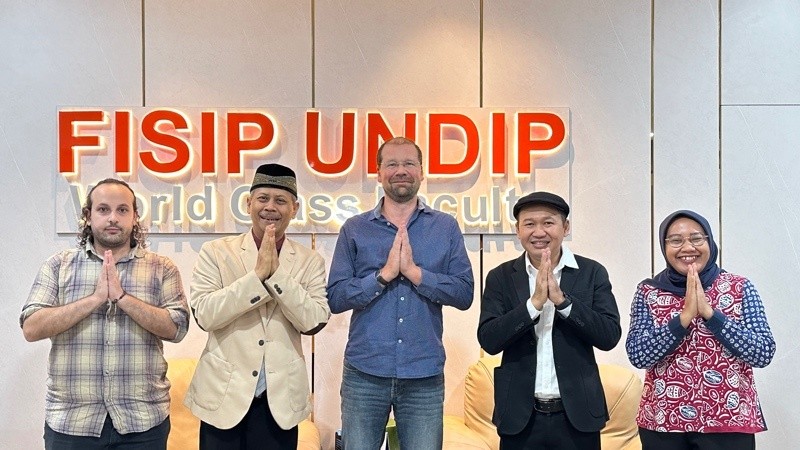UNDIP, Semarang (August 20, 2025) — Universitas Diponegoro (UNDIP) reaffirmed its commitment as a World Class University (WCU) by hosting an international academic at its Workshop on Writing for International Scientific Publications. The event, held on Wednesday, August 20, 2025, at the Faculty of Social and Political Sciences (FISIP), featured Prof. Ward Berenschot, an expert in comparative political anthropology from the University of Amsterdam, the Netherlands.
The workshop, held in the Senate Meeting Room, served as a crucial forum for UNDIP lecturers, researchers, and students to enhance their skills in writing for globally recognized journals. FISIP UNDIP researchers presented manuscript drafts covering strategic issues such as gender, BRICS, electoral democracy, Indonesian foreign policy, and political communication in the era of social media.
In his remarks, Dr. Drs. Teguh Yuwono, M.Pol.Admin., Dean of FISIP UNDIP, emphasized that the workshop stemmed from the extraordinary ideas of Vice Rector IV and his KBK team, marking a concrete step in strengthening academic capacity. “We hope this event brings real benefits for the institution and produces publications that position UNDIP on the global stage,” he said.
Vice Rector IV for Research, Innovation, and Cooperation, Wijayanto, S.IP., M.Si., Ph.D., shared an inspiring message with participants, describing academic writing as part of an “untold story.” “Every scholar has an academic story. By writing that story, it is not only documented but also contributes to global scholarly conversations. This activity is the essence of the academic culture we aim to develop at UNDIP,” he said.

During the main session, Prof. Berenschot provided in-depth reviews of each participant’s draft articles. He highlighted four key aspects of publishing in international journals: research readiness, availability of funding, the uniqueness of the topic, and persistence in the face of rejection.
“Indonesia has extraordinary research potential. The challenge is how to present findings in a way that gains global recognition. Do not give up when your article is rejected—that is part of the academic journey toward international quality,” Prof. Berenschot noted.
He also shared strategies to improve acceptance in reputable journals. First, he emphasized broadening the scope of topics to achieve greater complexity, such as adding two or more case studies to draw editors’ attention.
Second, he cautioned against relying on a single method, such as in-depth interviews alone, which can result in shallow data. Articles with limited data are often rejected. He recommended combining methods—for example, interviews with field ethnography—for richer data and analysis.
Third, he underscored the importance of framing within academic discussion. Researchers, he said, should compare Indonesian cases with similar cases from other countries. “By highlighting differences and similarities with global contexts, discussions become richer and more relevant to international readers,” he explained.
The workshop emphasized that FISIP UNDIP not only promotes high-quality research but also prepares young scholars to engage in international academic conversations. This workshop aligns with UNDIP’s commitment to strengthening its role as a globally recognized research university. (Public Communication/ FISIP/ Rif’at, ed. Nurul)










